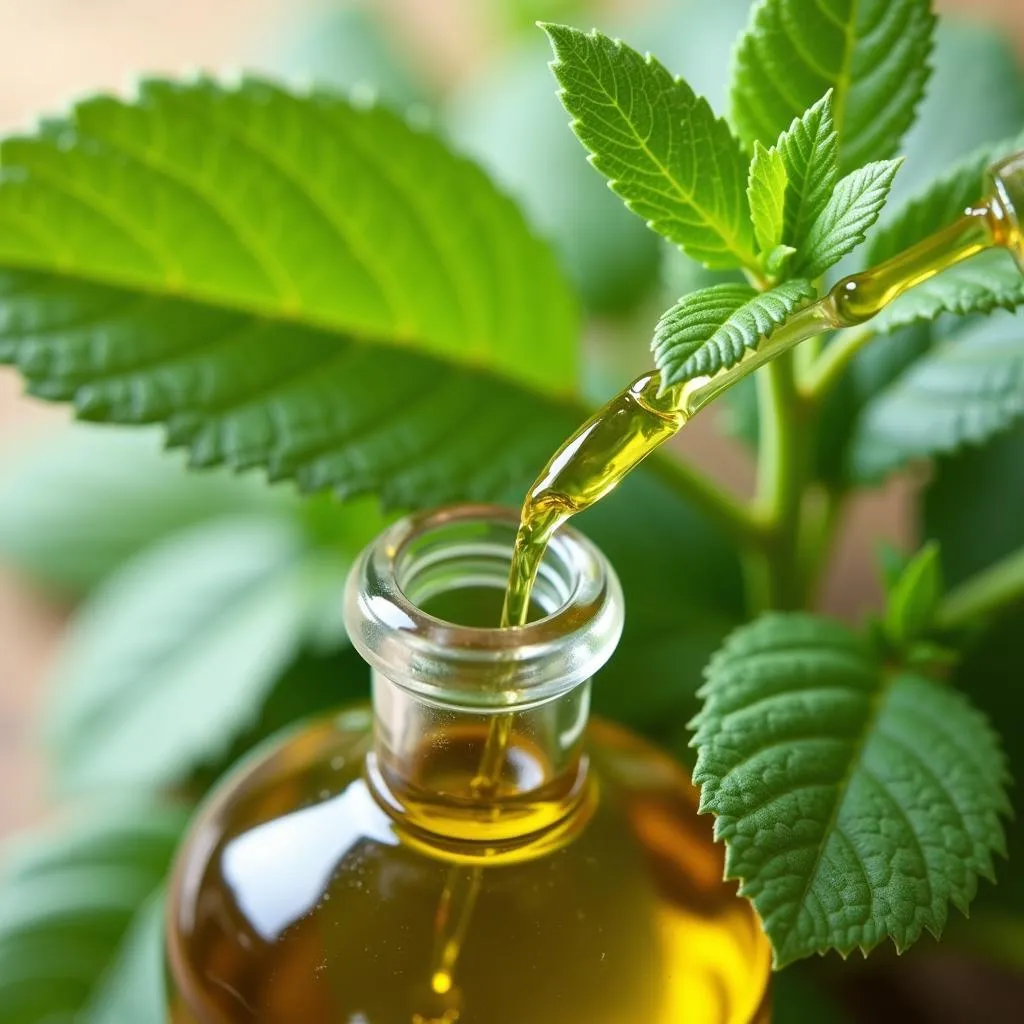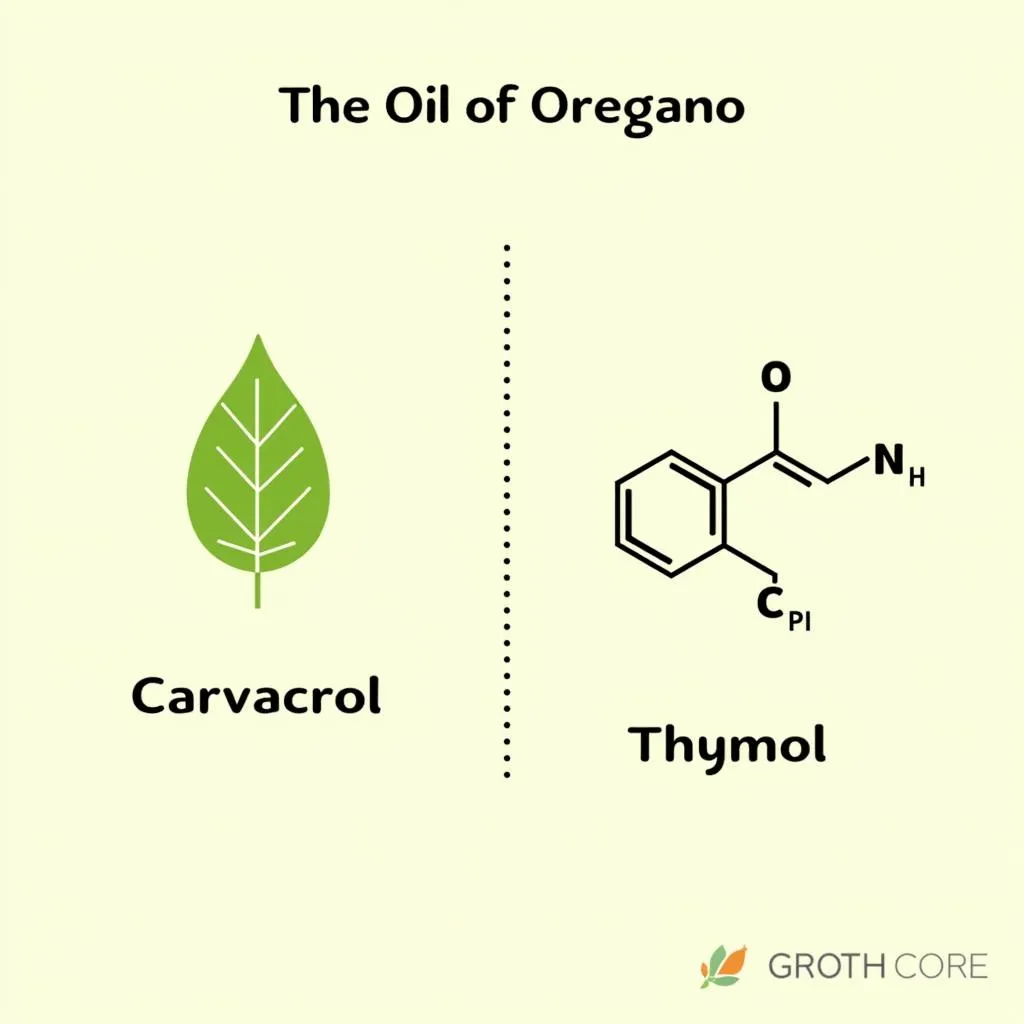Oil of oregano has been touted as a natural remedy for various ailments, including food poisoning. But can this potent oil actually combat the unpleasant symptoms of foodborne illness? Let’s delve into the science behind oil of oregano and its potential benefits for food poisoning.
 Oil of Oregano Extracted from Plant
Oil of Oregano Extracted from Plant
Understanding Food Poisoning and Its Causes
Food poisoning, an often debilitating condition, arises from consuming contaminated food or beverages. Bacteria, viruses, and parasites are the usual suspects behind this unwelcome guest in our stomachs. Common symptoms include nausea, vomiting, diarrhea, stomach cramps, and fever.
The Powerhouse of Oregano Oil: Active Compounds
Oil of oregano derives its potency from two key compounds: carvacrol and thymol. These powerful phenols boast antimicrobial properties, effectively targeting various bacteria, viruses, and fungi.
- Carvacrol: Studies suggest that carvacrol exhibits significant antibacterial activity against common foodborne pathogens like Salmonella and E. coli.
- Thymol: Known for its antiseptic and antifungal properties, thymol complements carvacrol’s action, further enhancing oil of oregano’s antimicrobial potential.
 Chemical Structures of Carvacrol and Thymol
Chemical Structures of Carvacrol and Thymol
Oil of Oregano for Food Poisoning: Does Science Support It?
While scientific research on oil of oregano specifically for food poisoning in humans is limited, existing studies on its active compounds show promising results:
- In vitro studies: Research demonstrates the effectiveness of carvacrol and thymol against various foodborne bacteria. For example, a study published in the International Journal of Food Microbiology found carvacrol to be effective against Campylobacter jejuni, a common cause of food poisoning.
- Animal studies: Research on animals suggests potential benefits of oregano oil in combating foodborne pathogens. However, more research is needed to confirm these findings in humans.
How to Use Oil of Oregano Safely
Oil of oregano is generally considered safe for most adults when used in moderation. However, it’s essential to dilute it with a carrier oil such as olive oil or coconut oil before topical application or ingestion. Start with a low dose (1-2 drops) and gradually increase as needed.
Important Note: Pregnant and breastfeeding women, individuals with allergies to oregano or other plants in the Lamiaceae family (mint, basil, sage), and those on blood thinners or with bleeding disorders should consult their healthcare provider before using oil of oregano.
Seeking Professional Medical Advice
It’s crucial to remember that oil of oregano is not a substitute for professional medical advice. If you suspect food poisoning, it’s crucial to:
- Stay hydrated: Dehydration is a common complication of food poisoning. Drink plenty of fluids like water, clear broth, or oral rehydration solutions.
- Rest: Your body needs time to recover and fight off the infection.
- Seek medical attention: If your symptoms are severe, persistent, or you belong to a high-risk group (young children, older adults, pregnant women, people with weakened immune systems), consult a healthcare professional immediately.
 Doctor Consulting a Patient with Food Poisoning
Doctor Consulting a Patient with Food Poisoning
Conclusion
While oil of oregano demonstrates potential as a natural antimicrobial agent, more research is needed to confirm its effectiveness in treating food poisoning in humans. Remember, oil of oregano is not a replacement for proper food safety practices and seeking medical attention when necessary. Always consult a healthcare professional for diagnosis and treatment of food poisoning.
FAQ
1. Can I use oil of oregano to prevent food poisoning?
While oregano oil possesses antimicrobial properties, it’s not a guarantee against food poisoning. Proper food handling, cooking, and storage practices remain crucial for prevention.
2. How long does it take for oil of oregano to work for food poisoning?
There is no definitive answer as research is limited. It’s best to consult a healthcare professional for personalized advice.
3. Are there any side effects of using oil of oregano?
Some individuals may experience mild side effects like upset stomach, heartburn, or allergic reactions. Always start with a low dose and discontinue use if you experience any adverse effects.
4. Can I give oil of oregano to children for food poisoning?
It’s crucial to consult a pediatrician before giving oil of oregano to children, especially in cases of suspected food poisoning.
5. What other natural remedies can help with food poisoning?
Ginger, peppermint, and chamomile tea are known for their soothing properties and may help alleviate nausea and vomiting. However, always consult a healthcare professional for appropriate treatment options.
Need Further Assistance?
For any concerns or inquiries about oil of oregano or food poisoning, our dedicated customer support team is available 24/7 to assist you. Contact us at Phone Number: 02437655121, Email: minacones@gmail.com or visit us at 3PGH+8R9, ĐT70A, thôn Trung, Bắc Từ Liêm, Hà Nội, Việt Nam.